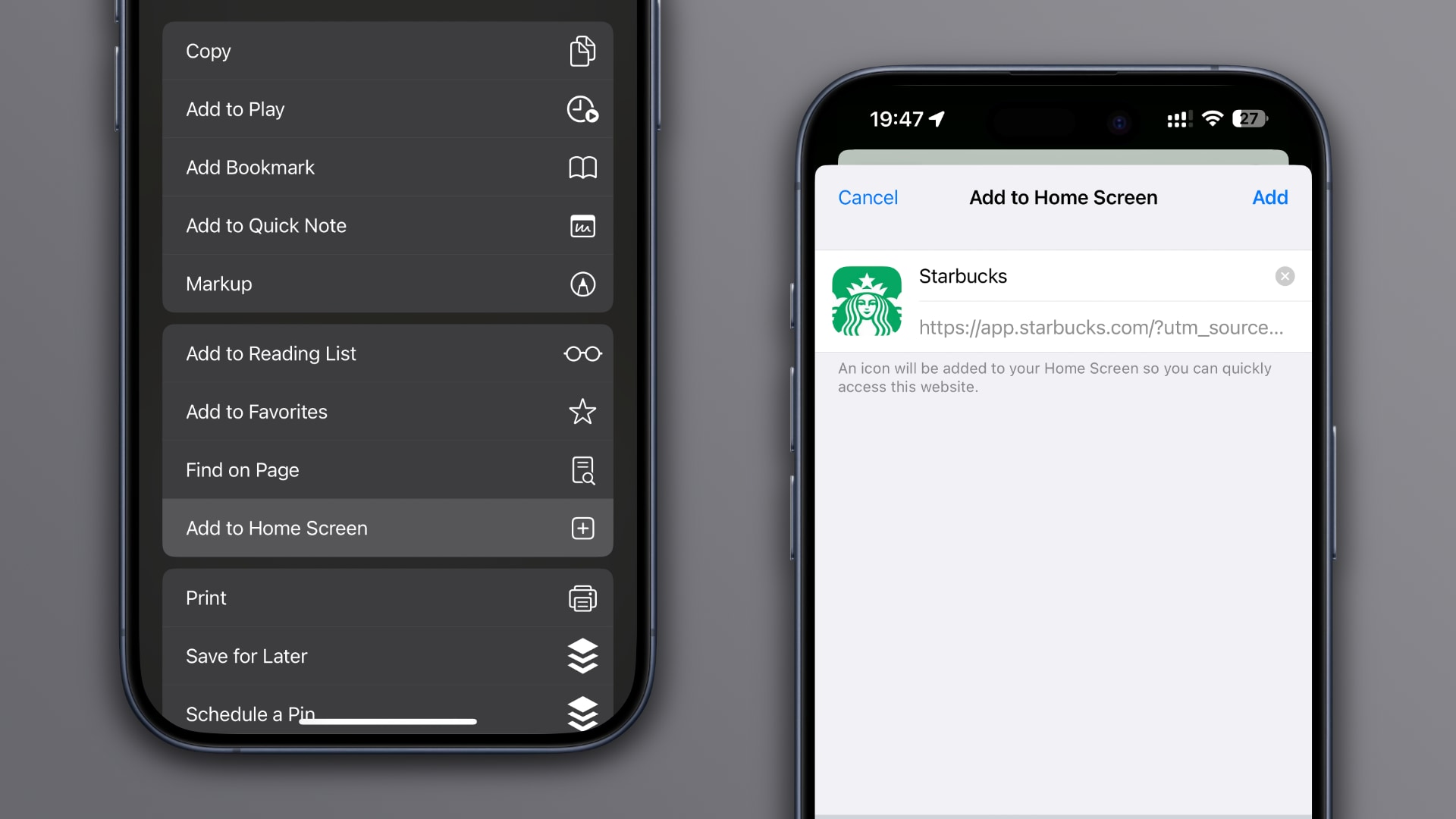Apple’s iOS 17.4 software won’t prevent people in Europe from saving progressive web apps to the Home Screen of their iPhones after all.

Apple made a tweak in iOS 17.4 for users in the European Union (EU) to disable the saving of progressive web apps (PWA) to the Home Screen from any browser other than Safari. Additionally, the company nerfed PWAs by disabling features like local storage for offline operation, web notifications and fullscreen appearance.
But the company has now decided to walk back those changes after learning that competition regulators in Brussels were scrutinizing its move.
Apple to permit Home Screen iPhone web apps in Europe
In a course reversal, Apple has announced that PWAs in iOS 17.4 will continue to work the same way as in iOS 17.3 and earlier. The company has updated the relevant page on its developer website with the following statement:
Previously, Apple announced plans to remove the Home Screen web apps capability in the EU as part of our efforts to comply with the DMA. The need to remove the capability was informed by the complex security and privacy concerns associated with web apps to support alternative browser engines that would require building a new integration architecture that does not currently exist in iOS.
We have received requests to continue to offer support for Home Screen web apps in iOS, therefore we will continue to offer the existing Home Screen web apps capability in the EU. This support means Home Screen web apps continue to be built directly on WebKit and its security architecture, and align with the security and privacy model for native apps on iOS.
Developers and users who may have been impacted by the removal of Home Screen web apps in the beta release of iOS in the EU can expect the return of the existing functionality for Home Screen web apps with the availability of iOS 17.4 in early March.
So PWAs aren’t insecure anymore? Good to know!
This only applies to PWAs powered by WebKit
However, if a third-party browser uses a rendering engine different from WebKit, the previous PWA restrictions will remain in effect for that particular browser.
“This means that all Home Screen web apps will still be powered by WebKit, regardless of whether the web app is added using Safari or not—exactly as it works today and has for years,” explains 9to5Mac, which first spotted the change. In my opinion, the reversal doesn’t change the fact that Apple did try to kill PWAs for everyone in Europe.
Apple’s harsh language
As part of the changes enforced by the Digital Markets Act (DMA) in the EU, Apple will allow third-party app marketplaces and alternative web payments on iPhone. It will also open up the iPhone’s NFC to third-party payment apps.
The company outlined other concessions made to appease EU regulators in a surprisingly harshly worded press release published on January 25, 2024.
In it, Apple argues the DMA creates “privacy and security risks” while bringing “a less intuitive user experience” and highlighting “new risks associated with downloading apps and processing payments outside of the App Store” that it cannot eliminate.
Great news: PWAs are back in the EU, albeit only on WebKit.
Thanks a lot for everyone who echoed the concerns of many developers around the world. Your voice matters, and Apple has listened to it.#Apple #PWA #WebApps #iOShttps://t.co/bqu6bKh3A1
— Mysk 🇨🇦🇩🇪 (@mysk_co) March 1, 2024
My favorite part is where the company comments on a new screen that people in the EU will see when launching iOS 17.4’s Safari for the first time, offering them a chance to choose their default browser from a list of popular choices.
“This change is a result of the DMA’s requirements and means that EU users will be confronted with a list of default browsers before they have the opportunity to understand the options available to them,” Apple remarks.
But wait, there’s more. “The screen also interrupts EU users’ experience the first time they open Safari intending to navigate to a webpage,” it reads.
“Dear Tim” emails from concerned EU users
Apple also published a 60-page white paper covering all the iOS 17.4 changes for EU users in detail. One particular gem that caught my eye—sixteen “Dear Tim” emails from supposedly concerned EU citizens who apparently fear the changes.
Apple drops a massive 60-page white paper covering all the iOS 17.4 changes in Europe—it even cites "Dear Tim" emails from supposedly concerned EU citizens https://t.co/2TLbAgV4Wv pic.twitter.com/oqHL1kW6NY
— iDownloadBlog (@iDownloadBlog) March 1, 2024
“Thank you for leading a company that puts customers first, no matter if it’s in regards to their privacy, health or human rights,” says one message. “As an EU citizen, …I will not be allowing sideloading on my devices.” Another says: “I really hope that you will offer me as an EU client the option to not use any sideloaders. I want to rely on the proven App Store and not some nonsense…”